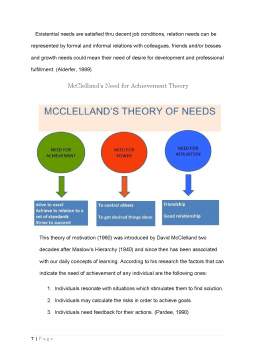Cuprins
- Introduction 2
- Motivational theories 3
- Motivational Content Theories 4
- Maslow's Hierarchy of Needs .4
- Herzberg's Theory of Hygiene 5
- Alderfer’s need modified Theory 6
- McClelland's Theory of Needs 7
- Procedural Motivational Theories 8
- Vroom's Expectations Theory .8
- Adam's Equity Theory ..8
- Why do People Work? 9
- Conclusion and remarks 10
- Reference List 11
Extras din proiect
Introduction
In order to understand motivation, managers must understand first the particular reasons that make any individual act/behave in a certain way. This kind of situation is what fascinate managers and psychologists in the same time. It is well known that motivation is an intern process and not something that can be somehow forced from the outside.
In order to reach and maintain success in relation with the employees, all managers today must deeply know what means motivation process.
Building a complete list of reasons why people today do what they do is at least difficult if not impossible but if we were to list the first ones that come to our mind we can mention the intrinsic desire to achieve something or the personal and social pressure or simply the comparison with the neighbour or colleague or a friend.
As we have learned last semester, the goals of any company can be achieved only thru the common efforts of their employees. Nowadays it is proven that most companies are both efficient and productive due to the fact that employees respond well to the company's requirements as long as their efforts, efforts that are related to motivation, are viewed qualitatively rather than quantitatively.
Motivation or what makes people act in a certain way has always been considered to be the way in which employees can be determined to work in an organization more and better. It is from this point of view that the idea of the concept of reward but also of punishment was strengthened. At the same time, it becomes essential to know the main theories about motivation for building solid motivational policies.
Motivational theories
When discuss about certain assets of an organization result, almost immediately we understand why people represent the most difficult manageable resource. Is because they have their needs and demands in order to contribute to success and growth of the organization. (Osabiya, 2015)
In the modern recorded history are at least 12 basic human needs stated by Farren (2000) and these are: health and family, economics needs and learning, work/career needs and home, social relationships and spirituality, community and leisure, mobility and environment/safety. All of the above can be classified or categorised in extrinsic and intrinsic motivation with the mention that the extrinsic motivation is related to a high salary or other benefits, things that are related to tangible rewards and the intrinsic motivation is more related to psychological rewards such as being well treated or receiving recognition. Over the years, motivational theories have been divided in motivational content theories and procedural motivational theories.
Bibliografie
Alderfer, C. P. (1989) Theories Reflecting My Personal Experience and Life Development, The Journal of Applied Behavioural Science [Online] 25(4), pp. 351- 365. Available from: https://journals.sagepub.com/doi/10.1177/002188638902500404., [Accessed 2 March 2020]
Armstrong, M (2012), Armstrong's Handbook of Reward Management Practice: Improving Performance Through Reward, Kogan Page, London
Armstrong, M. & Stephens, T. (2005) A handbook of employee reward management and practice, Kogan Page, London
Bruno, F., (1999) Not just for the money, Cheltenham: Edward Elgar
Deci, E. and Richard, R., (2000) The ‘’what’’ and ‘’why’’ of goal pursuits: Human needs and the self-determination of behaviour, Psychological Inquiry, 11(4), pp.227-268
Farren, C. (2000) Mastery: The Critical Advantaging Chowdhury, S. (ed.) Management 21C, Financial Times prentice Hall, p. 95.
Ferguson, D., B., (1987) Management styles and employee motivation, Arlington
Gagne, M. and Deci, E., (2005) Self-determination theory and work motivation, Journal of Organizational Behaviour, 26, pp.331-362
Gawel, J., E., (1996), Herzberg’s Theory of Motivation and Maslow’s Hierarchy of Needs, Practical Assessment, Research and Evaluation, vol.5(11)
Herzberg, F., (1959), The Motivation to Work, New York, John Wiley and Sons
Herzberg, F., (1976), The managerial choice, to be efficient and to be human, Homewood, Dow Jones-Irwin
Kaur, A., (2013), Maslow’s Need Hierarchy Theory: Applications and Criticism, Global Journal of Management and Business Studies, 3(10)
Lane, R., (1992) Work as ‘’disutility’’ and money as ‘’happiness’’: Cultural origins of a basic market error, Journal of Socio-Economics, 21(1), pp. 43-65
Lopes, H., (2011) Why do people work? Individuals wants versus common goods, Journal of economic issues, 45(1)
Maslow, A., H., (1954) Motivation and Personality, New York: Harper and Bros
Mekiliuwa, J., F., (2015) Motivation as a Management Tool for Higher Productivity in Organisations: A Case Study of Central Securities and Clearing System Limited, Lagos Nigeria- Financial Market Infrastructure (FMI), the Clearing and Settlement System of the Nigerian Capital Market [Online]. Available from : http://stclements.edu/grad/gradjosep.pdf [Accessed 12 April 2020]
Mullins, L., J., (2005), Management and Organisational Behaviour, Prentice Hall, UK 7th ed.
Osabiya, B. (2015) The effect of employee’s motivation on organizational performance. Journal of Public Administration and Policy Research 7. 62-75
Rogers, F., G. and Levey, I., N., (1987) Getting the best out of yourself and others, New York: Harper & Row
Taylor, A.H. and Dorn, L., (2006), Stress, fatigue, health, and risk of road traffic accidents among professional drivers: the contribution of physical inactivity. Annu. Rev. Public Health, 27, pp.371-391.
Thomson, R. (2002). Managing People. 3rd ed. Oxford: Butterworth Heinemann, pp.71-83.
Udechukwu, I., I., (2009), Correctional Officer Turnover: Of Maslow’s Needs Hierarchy and Herzberg’s Motivation Theory, Public Personnel Management, 38(2)
Preview document
Conținut arhivă zip
- Motivation and impact.docx






















